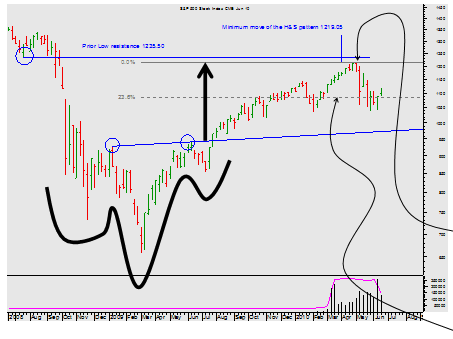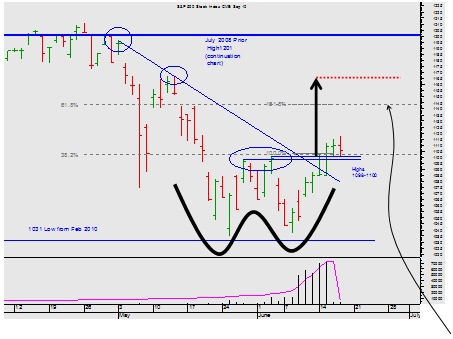Right Time to Buy the S&P Stock Market Index?
Stock-Markets / Stock Markets 2010 Jun 21, 2010 - 03:01 AM GMTBy: Seven_Days_Ahead
 The S&P500 along with other global equity markets has suffered a deep correction over recent months which erased all the gains made from the beginning of February this year.
The S&P500 along with other global equity markets has suffered a deep correction over recent months which erased all the gains made from the beginning of February this year.
The sell-off was driven by the spread of the Sovereign debt crisis, which began as a local Greek problem, but expanded to engulf the entire Euro zone, with traders fearing the global economy could be at risk through contagion.
The Technical Trader’s view:
 |
WEEKLY JUN10 CHART The context of the present situation in the market is clearly illustrated here: the Head and Shoulders Reversal formed at the end of 2008 and the beginning of 2009 drove the market up as far as the measured minimum target of 1219. That level coincided with the resistance from the low in 2008 at 1235.50. Both these factors topped the market out and sent it down to the 23.6% retracement support. There it has dithered. Now look closer…. |
|
DAILY SEP10 CHART The pull-back in detail reveals the creation and completion of a clear Double Bottom. Note too, the coincidence of the completion level with the Fibonacci cluster just above. The break up though the two together is important and establishes powerful support beneath the market. The minimum move for the market is easily measurable – up as far as 1165 or so. But note well the fib cluster at 1143 which may make the market pause. The market is well set and ripe for buyers |
The Macro Trader’s view:
For now, those fears have eased. The EU/Euro zone authorities have taken several major steps to ward off default:
- Their first act was to launch a US$1.0T rescue fund,
- next they announced deep cuts to their budget deficits, and
- The latest action is an attempt by the French and Germans to put in place an EU-wide economic government.
In the US equity traders had their own reasons for withdrawing from risky assets. The US authorities had pledged to reform the financial sector so that a financial crisis like the one that has recently swept through the global economy, could never happen again.
Some of the reforms caused major concerns on Wall Street and also fuelled the weakness of the S&P500. But over recent days, the market has shown signs of recovery, but how durable is it?
We are long-term bulls of equities. We judge the major economies including the US economy are in recovery, but because the UK and Euro zone have begun a period of fiscal retrenchment, the global recovery could lose some of its dynamism over the short/medium term as those countries’ economies adjust to the new fiscal reality.
In the US, the administration remains convinced that the best way to fight economic weakness is to keep spending and borrowing with the US debt to GDP ratio heading for 100% in the next few years on current plans.
So while Europe tries to get its fiscal house in order, the US is acting as something of a counter weight. But recent US data has been disappointing. Indeed the most recent non-farm payroll report was clearly weak. Retail sales reported last week, were also surprisingly weak. This week has seen some very disappointing Housing starts and Building permits data resulting from the expiry of a tax credit designed to help home buyers.
So is this a good time to buy into the S&P500 or should we wait?
If we are right and the steep sell off was indeed only a vicious correction, then this and other equity markets should recover fully. But the circumstances that brought about the sell-off in the first place are still in play. Despite everything the EU/Euro zone has done in recent weeks to re-assure markets about the health of sovereign risk, Spain is reported to have sought help from the IMF, since denied, but it is clear that traders remain nervous about the fiscal health of several Euro zone economies.
We judge fiscal retrenchment is all very well, but it needs to go hand in glove with growth promoting policies. The US recognizes the need for growth, but the President doesn’t yet accept he needs to reduce spending. And the EU seems unable to grasp the need to generate growth in the Euro zone periphery. Germany has announced big deficit cuts, thereby passing on an opportunity to act as a powerful locomotive for the Euro zone economy.
All of these events lead us to remain cautious about stocks. We do not want to sell, that isn’t our view, but we are not yet ready to buy either, so we remain square but looking for signals to encourage us to believe the sell-off is indeed over.
Mark Sturdy
John Lewis
Seven Days Ahead
Be sure to sign up for and receive these articles automatically at Market Updates
Mark Sturdy, John Lewis & Philip Allwright, write exclusively for Seven Days Ahead a regulated financial advisor selling professional-level technical and macro analysis and high-performing trade recommendations with detailed risk control for banks, hedge funds, and expert private investors around the world. Check out our subscriptions.
© 2010 Copyright Seven Days Ahead - All Rights Reserved
Disclaimer: The above is a matter of opinion provided for general information purposes only and is not intended as investment advice. Information and analysis above are derived from sources and utilising methods believed to be reliable, but we cannot accept responsibility for any losses you may incur as a result of this analysis. Individuals should consult with their personal financial advisors.
Seven Days Ahead Archive |
© 2005-2022 http://www.MarketOracle.co.uk - The Market Oracle is a FREE Daily Financial Markets Analysis & Forecasting online publication.




